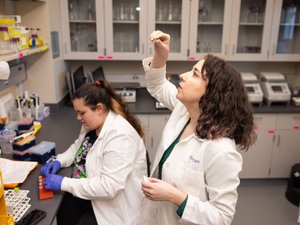
A nonprofit that aims to make North Carolina a top player in innovation has awarded $5.2 million in grant funding to help commercialize eight research projects across the state, including two at UNC Charlotte.
UNC Charlotte received about $800,000 from NCInnovation for its projects focused on purifying drinking water and power grid efficiency, said John Daniels, the university's vice chancellor for research. NCInnovation, which is focused on advancing research at North Carolina universities into commercial opportunities, distributed the funds to researchers at seven schools in the state.
Daniels said most research doesn't get access to many funding sources. And if it does, the funding typically helps develop the technology to an early development stage, which may include building the concept or obtaining data. That's been frequently defined in the industry as the "valley of death," the period from inception to product-market fit.
"NCInnovation was specifically designed to target that 'valley of death,'" Daniels said. "Both the water treatment and the uninterrupted power, both of those things honestly might not see the light of day, might not have an impact, unless they get this kind of funding."
Jordan Polar, professor of chemistry at the school, is leading the development of the clean water project. He has built technology that will remove "forever chemicals," or a large group of synthetic chemicals, from water.
The substances can be problematic to health and are typically resistant from being removed. Polar discovered an approach to achieve that more effectively than current market solutions.
Sukumar Kamalasadan, Duke Energy distinguished professor of electric power engineering, is overseeing the power efficiency project. The technology was created to improve the quality of electricity to prevent unexpected power interruptions at commercial or industrial companies. Power outages could cause economic, health, environment or public safety issues.
Both projects will help spur revenue, jobs and economic growth across North Carolina, Daniels said.
"We have such a robust array of technologies and research products, and, so, this kind of investment from NCInnovation is really an opportunity to highlight the inventory of intellectual property and technologies that can be commercialized and have an economic impact," he added.
In April, NCInnovation began seeking proposals for the pilot grant program. The nonprofit aims to scale the initiative after testing its processes and implementing a statewide search for proposals later this year.
NCInnovation is backed by $500 million in the latest state budget to help North Carolina universities commercialize their research and technology. The state budget that lawmakers approved last year included plans to direct two portions of $250 million to NCInnovation to establish the grant funds, with one in each fiscal years 2023-24 and 2024-25.
Initial funding for the research projects will be sent to university grant recipients after contracts are executed and NCInnovation provides a formal notice to its government partners. Eligible researchers will receive the funding in stipends based on meeting specific project milestones. The money will go toward projects focused on health, energy and environmental challenges.
UNC Charlotte is among the anchor institutions to lead NCInnovation's work. Others include East Carolina University, N.C. A&T State University and Western Carolina University.
Additional projects that received grant funding from the pilot program include: lithium refining at UNC Greensboro; melanoma treatment at Eastern Carolina University; multi-year vaccine development at UNC Wilmington; mosquito-borne infectious disease identification and risk assessment at Western Carolina University; beehive improvement and monitoring system at Appalachian State; and neuro drug delivery system at N.C. A&T.
Daniels said the grant funding was a "very competitive process," as each school had to meet substantial criteria. And although UNC Charlotte had 20 proposals, he is hopeful the university's two selected projects will claw out from the "valley of death."
"This is just the surface," he said. "We have lots of technologies that are just sort of sitting there that could make an impact, but we need the kinds of investment like we get from NCInnovation to meet and fill that 'valley of death.'"








